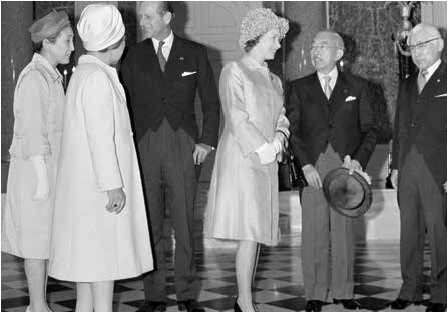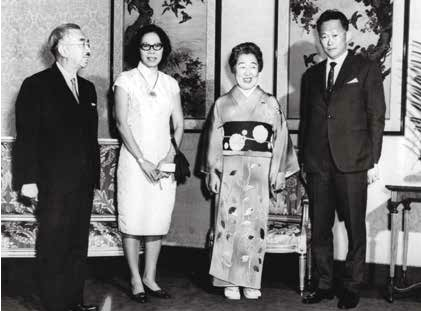Issue:


Diaries kept by the imperial translator of the Showa emperor offer insight his post war thoughts, personal and political
This story began with a chance encounter in the spring 13 years ago. On Apr. 10, 2007, I was at the FCCJ to attend a professional luncheon for Asia Development Bank President Haruhiko Kuroda. During the meal, I exchanged courtesies with an American gentleman who happened to be seated on my left. He appeared to be in his early 70s, with a piercing look, and wore black rimmed eyeglasses. His business card read “Publisher, Cambodia Daily.” Seeing his name, I did a double take.
He was Bernard Krisher, the former Tokyo bureau chief of Newsweek magazine, and I was very aware of his reputation. In September 1975, he had achieved a rare, one-on-one interview with the Emperor Hirohito, who was about to embark on his first visit to the United States.
At the time of our meeting, I was about to publish a book about Emperor Hirohito, known posthumously as the Showa Emperor. Krisher kindly invited me to lunch at a café near his home in Hiroo on several occasions, during which one of the main topics of our conversations was anecdotes about the postwar US Japan relationship.
One day, Krisher mentioned offhand that he had a collection of audio cassette recordings of interviews with Hideki Masaki, Emperor Hirohito’s long serving interpreter. Masaki had a stellar career. Following his graduation from the Tokyo Imperial University, he entered the Ministry of Foreign Affairs in the early 1930s. Following postings to the UK and
US, he served as ambassador to Afghanistan. From 1959, he served as interpreter for the emperor for two and a half decades. During this period, Masaki kept a diary in English, in which he wrote down the contents of conversations between the emperor and foreign guests.
In January 1989, just after the emperor’s death, Masaki sat down with Krisher for a series of interviews, during which he read out the contents of his diaries. It was enough to fill 20 cassette tapes. I was surprised to learn that the tape’s contents had yet to be published, and Krisher was kind enough to lend me the tapes for my own use. The “Masaki Tapes” turned out to provide fascinating insight into the Showa Emperor’s thoughts and beliefs.
Some of the emperor’s conversations with foreign leaders and dignitaries were deeply personal.
On May 28, 1963, for example, King Bhumibol Adulyadej of Thailand, accompanied by Queen Sirikit, visited Japan and met with the emperor at the palace. According to Masaki, Thailand’s monarch aired concerns about the education of his children.
King Bhumibol told the emperor, “I believe it is important to give education to my children as members of the royal family. But they are very idle and lazy and don’t like studying. But my 12-year-old eldest daughter is a hard worker and she likes science. Thailand will need scientists in the future . . . and she wants to be one herself.”
The weight of royalty seems to have concerned Britain’s Queen Elizabeth II on a visit to Tokyo. On May 7, 1975, when she and her husband Prince Philip visited Tokyo, the queen told the emperor, with what may have been a sigh, that monarchy is a difficult thing to deal with. “You’ve been Emperor for 59 [sic] years. I’ve been Queen for 23 years.”
At that time, the queen was making plans to visit the US the following next year, in observation of America’s bicentennial celebrating its independence from Great Britain.
According to Masaki, she said to the emperor, “It seems funny for me to visit the US that rebelled against us.” But she seemed resigned to it, however, stating, “After 200 years, it will be all right.”
Thailand’s King and Great Britain’s Queen, known for charismatic presence and widely respected by their subjects, both voiced largely private concerns, which can be perceived as putting themselves in the same boat as Japan’s emperor.
Among the guests the emperor received from abroad were a few with whom the subject matter touched upon extremely delicate political topics. One such person was Singapore Prime Minister Lee Kuan Yew, who met with the emperor on Oct. 22, 1979.
Masaki, who interpreted the exchange, told Krisher in the tapes: “Lee Kuan Yew mentioned the effect of Japanese and Chinese civilization on the Korean peninsula. He considered Japanese civilization is open to the outside world and Chinese is closed, and said it was better for Korea to be occupied by Japan.”
According to Masaki,”[His Majesty] was entirely silent, as he didn’t say anything. He couldn’t say yes or no. The Lytton Commission Report (which investigated the causes of the Japanese invasion of Manchuria) [mentioned] Japan’s successful efforts for reforestation in Korea but we can’t say that. They [South Korea] dislike whatever we may say about Japan’s contribution.”
BUT WITH OTHER GUESTS, the subjects of conversation took on more political tones. According to Article 1 of the Japanese Constitution, which was drafted by the Allied occupation just after WWII, the emperor of Japan is defined as “symbol of the State.” His role is ceremonial, and he is not allowed to influence the government. Based on the contents of the Masaki tapes, however, that did not negate Emperor Hirohito’s deep interest in world affairs, particularly the threat of communism.
For example, on Oct. 18, 1962, in an audience with the UK’s Commissioner for Singapore and Commissioner General for South-East Asia, the Earl of Selkirk, one of the main topics of discussion was communism in Asia.
The emperor asked, “I understand the communist party of Malaya has generally been suppressed. What is the present situation?” To which Selkirk explained that the communists were scattered in the jungle or border areas and suppressed by troops of Malaya, Australia and New Zealand.
The commissioner also touched on the situation in Laos and Vietnam, and the emperor was said to have responded, “It is good that people of these countries are conscious of the peril of international communists.”
On March 9 of the same year, the emperor was visited by David Rockefeller, president of Chase Manhattan Bank, who was on a world tour. Rockefeller is said to have remarked, “If the US, Europe and Japan should closely cooperate, then we can contain the advance of the Soviet Union and China,” to which the emperor showed his wholehearted agreement by responding, “I also believe so.”
Two months earlier, on Jan. 11, Dean Acheson, former US Secretary of State and advisor to President John F. Kennedy, called at the palace. Acheson said he would be meeting Prince Norodom Sihanouk in Cambodia, and provided a detailed explanation of the US policy toward Thailand and Cambodia.

As events were to transpire, 1962 turned out to be an eventful year. Construction of the Berlin Wall had begun the previous August. Then in October came the Cuban missile crisis, during which the US and Soviet Union narrowly avoided nuclear conflict.
Amid the escalating tension of the Cold War, Japan’s emperor, relegated to being a “symbol of the State” with no role in politics, nevertheless harbored a sense of crisis, and encouraged foreign visitors to discuss the international situation with him, while energetically conveying his own message in return. None of these exchanges were ever divulged by the Imperial Household Agency.
THE EMPEROR’S VIEWS, AS recorded by Masaki, turned out to be consistent with information I chanced upon earlier. At the National Archives in London, I accessed a declassified British Foreign Office document that underscored the emperor’s personal views.
In June 1952, the British embassy in Tokyo dispatched a report to London concerning the defense minister’s audience with the emperor. According to the document, “after enquiring after the health of the Queen and the Royal family, [the emperor] asked a number of questions about the international situation which included China, the Soviet Union, Malaya, Persia and Egypt. We returned suitable replies. Grand Master of Ceremonies explained afterwards, that while the Emperor is very interested in international affairs, under the present constitution he is not kept informed by the Government and is consequently unable to express any views of his own.”
But it is clear that he had his own views, and equally clear that he was interested in world affairs despite his distance. He could surely recall the 1930s, when the Japanese military and government had failed to provide the young emperor with full and accurate information, while the conflict between Japan and China stalemated, and relations deteriorated with the Western powers.
After the war’s end, the drawing up of a new constitution by the Americans made little difference in the information blackout, effectively making the imperial palace akin to an isolated island. It’s highly possible that the emperor, who was deeply concerned about risk of repeating the mistakes of the 1930s, was not content to rely only on the government’s briefing, but resorted to gathering whatever information he could glean from foreign guests.
According to Masaki, while Hirohito was known to the world as a marine biologist, from his various comments, it’s clear that the emperor’s worldview was based on his study of history, including that of the Roman Empire. After observing coups that took place in Iran and Afghanistan in the 1970s, the emperor cautioned imperial family members, saying “It was always the people surrounding a monarch who brought about downfall.”
Thanks to the dedicated record keeping by these two men, I was able to get a look at something that is rarely shared with the public: the emperor’s discussions with foreign dignitaries, and his thoughts on world politics. Hideki Masaki passed away in 2001. Bernard Krisher died last year at the age of 87.

